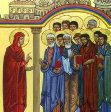
|
Mother Pelican
A Journal of Sustainable Human Development
Vol. 7, No. 9, September 2011
Luis T. Gutiérrez, Editor
|
|
|
|

|
|
|
Loss of confidence in the current order
Leonardo Boff
Originally published in
Iglesia Descalza, 8 July 2011
REPRINTED WITH PERMISSION

|

|
From the perspective of the vast majority of humanity, the current order is an order in disorder, produced and maintained by the forces and countries that benefit from it, increasing their power and profits. This disorder stems from the fact that economic globalization has not given rise to political globalization. There is no entity or force to control the voracity of economic globalization. Joseph Stiglitz and Paul Krugman, two Nobel laureates in economics, have criticized President Obama for failing to put the brakes on the thieves of Wall Street and the City rather than surrender to them. After having caused the crisis, they still benefited from billion dollar investments of public money. And they came back, successfully, to the system of financial speculation.
These exceptional economists are the best when making analyses but mute when it comes to presenting ways out of the current crisis. Perhaps, as they have hinted, because they're convinced that the solution to the economy is not in economics but in rebuilding social relations destroyed by the market economy, especially the speculative one. The latter has no compassion and is devoid of any goals for the world, society and politics. Its purpose is to accumulate the most and to that end it must subordinate states, break laws, make labor laws flexible, and establish national economies, forcing countries in crisis to privatize everything that is marketable, throwing the people into poverty and despair.
For speculators, in Brazil, the money is used to make more money and not to produce more goods for those who need them. Here, the government has to pay more than one hundred billion U.S. dollars annually for acquired loans, while only about sixty billion is devoted to social projects. This disparity is ethically perverse, a consequence of the type of society it is obliged to keep up, which puts the economy as a central structuring axis and makes everything else merchandize, even the common necessities of life such as water, seeds, air and soil.
There are many who support the thesis that we are in a dramatic moment of breakdown of social ties. Alain Touraine even speaks of a post-social rather than a post-industrial phase.
This social decay is revealed by polarization and through radically opposing logic: the logic of productive capital, about 60 billion dollars/year, and that of speculative capital, about 600 billion dollars under the aegis of "greed is good." The logic of those advocating the greatest profit potential and that of those who fight for the rights of life, humanity and the Earth. The logic of individualism that destroys the "common home", the growing number of those who no longer want to live together, and the logic of social solidarity based on the most vulnerable. The logic of the elites who make intra-system changes and appropriate the benefits, and the logic of workers threatened with unemployment, and unable to intervene. The logic of the acceleration of material growth (Brazil) and that of the limits of every ecosystem and the earth itself.
There is widespread mistrust that anything good for humanity can come from the prevailing system. We go from bad to worse in all that relates to life and nature. The future depends on the flow of trust people have in their abilities and the authentic possibilities of reality. This confidence is dwindling day by day.
We are facing this dilemma: either let things continue as they are and then we will sink into a terminal crisis, or we engage in the development of a new social life that will sustain another type of civilization. New social ties will not be derived from current policy and technology, detached from nature and a synergetic relationship with the Earth. They will be born of a minimum consensus among humans, to be built around the recognition and respect for the rights of life, of every social subject, humanity and the Earth, considered as Gaia and our common Mother. The technology, policy, institutions and values of the past should serve this new social life. I've been thinking and writing about these things for at least twenty years. But who listens? It's a voice lost in the wilderness. "I cried out and saved my soul" (clamavi meam et salvavi animam meam, Marx would say desolately).
|
Latin America's contribution to a geosociety
Leonardo Boff
Originally published in
Iglesia Descalza, 5 August 2011
REPRINTED WITH PERMISSION
There is growing resistance all over the world to the system of domination of global capitalism by big multinationals over the nations, specific people, and nature. For better or worse, a trend towards environmentally oriented practices and projects that are now trying something new, is emerging. The base is always the solidarity economy, respect for the cycles of nature, synergy with Mother Earth, economics in the service of life and not profit, and a policy of hospitality, tolerance, cooperation and solidarity among the different peoples, thus removing the basis for religious and political fundamentalism, and for the terrorism that we have seen in the United States and now in Norway.
Of the many existing projects in Latin America, such as a solidarity economy, family organic agriculture, clean alternative energies, the Via Campesina, the Zapatista Movement and others, we want to highlight two because of their universal significance: the first is "Right Livelihood" and the second is "Communal and Earth Democracy" as an expression of a new type of socialism.
"Right Livelihood" is present throughout the Abya Yala continent (the indigenous name for the South American continent), from the far north to the deep south, under many names, of which these two best known are suma qamaña (from the Aymara culture) and suma kawsay (from the Quechua culture). Both mean "the process of life in its fullness." This comes from personal and social life in harmony and material and spiritual balance. The first thing is knowing how to live and then knowing how to live together -- with others, the community, with the Divine, Mother Earth, and her energy present in the mountains, waters, forests and jungles, in the soil, sun, moon and every being. Harmony is sought, not accumulation of wealth but production of what is sufficient and decent for everyone, respecting the cycles of the Pachamama and the needs of future generations.
This "Right Livelihood" has nothing to do with our "good life" or "quality of life." Our good life is accumulating the material resources to be able to consume more within the dynamics of unlimited progress which is driven by competition and a merely utilitarian relationship with nature, without respecting its intrinsic value or recognizing ourselves as part of it. So that some can be well off, millions have to live badly.
"Right Livelihood" is not simply identified with our "common good" thought of only in terms of human beings in society, in an unconscious anthropo- and socio-centrism. "Right Livelihood" covers everything that exists, nature with its different beings, all humans, the search for balance among all, also with the spirits, with wise people (grandmothers and grandfathers who have died), with God, so that all can live together harmoniously. We cannot think of "Right Livelihood" without the widest possible human, natural, earthly and cosmic community. The "minga", which is communal labor, expresses this spirit of cooperation well.
This category of "Right Livelihood" and "Living Well" has gotten into the constitutions of Ecuador and Bolivia. The great task of the state is to create the conditions for this "Right Livelihood" for all beings and not just for humans.
This perspective, born on the periphery of the world, with all its utopian charge, is aimed at all because it is an attempt to respond to the current crisis, which will be able to guarantee the future of life, of mankind and Earth.
The other Latin American contribution to another world possible is "Communal and Earth Democracy." It's a kind of social life, existing in the cultures of Abya Yala, suppressed by colonization but now, with the indigenous movement rescuing its identity, it is catching the eye of analysts. It's a form of participation that goes beyond traditional European-style representative and participatory democracy. It includes them but adds a new element: the community as a whole. The latter participates in the development of projects, in their discussion, in consensus building and implementation. It presupposes an already established community life in the population.
It is distinguished from other types of democracy because it includes the whole community, nature and Mother Earth. It recognizes the rights of nature, of animals, forests, and water, as shown in the new constitutions of Ecuador and Bolivia. It expands legal identity to other beings, especially Mother Earth. Because of the fact that they are living beings, they have intrinsic value and are bearers of dignity and rights, and therefore deserving of respect.
Democracy will then be social-earthly-planetary, Earth democracy. Some say all this is utopian. And it is. But it is a necessary utopia. When we have overcome the crisis of the Earth (if we overcome it), the path of humanity will be to organize ourselves globally around "Right Livelihood" and "Earth Democracy", Biocivilization (Sachs). There are already early sign of this future.
About the Author: Leonardo Boff is well known as a champion of social and environmental justice in Latin America and elsewhere. He is a liberation theologian and author of more than sixty books in the areas of theology, spirituality, philosophy, anthropology, and mysticism. According to the biography posted in his
web site, "for 22 years he was the professor of Systematic and Ecumenical Theology at the Franciscan Theological Institute in Petrópolis. He has served as a professor of Theology and Spirituality in various centers of higher learning and universities in Brazil and the rest of the world, in addition to being a visiting professor at the universities of Lisbon (Portugal), Salamanca (Spain), Harvard (United States), Basel (Switzerland), and Heidelberg (Germany)."
|
|Back to TITLE|
Page 1
Page 2
Page 3
Page 4
Page 5
Page 6
Page 7
Page 8
Page 9
Supplement 1
Supplement 2
Supplement 3
Supplement 4
Supplement 5
Supplement 6
PelicanWeb Home Page
|
|
|
|
"Human development, if not engendered, is endangered."
UN Human Development Report, 1995
|
|
Page 3
|
|
FREE SUBSCRIPTION
|
![[groups_small]](groups_small.gif)
|
Subscribe to the
Mother Pelican Journal
via the Solidarity-Sustainability Group
Enter your email address:
|
|
|
|